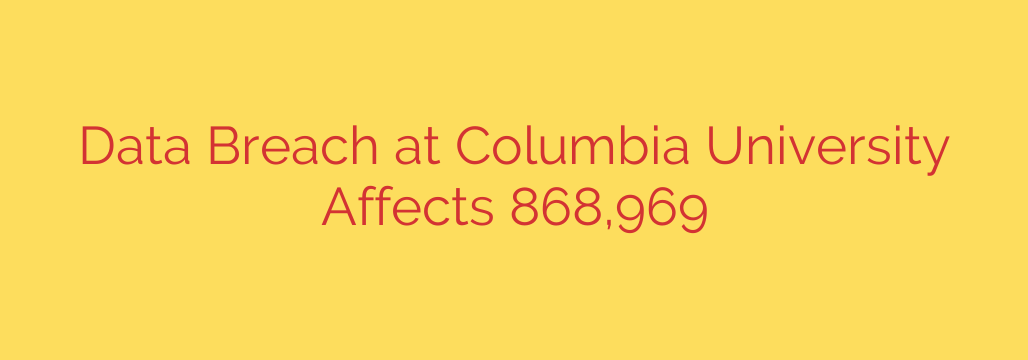
Columbia University Data Breach: What to Know If Your Data Was Exposed
A significant data breach at Columbia University has compromised the personal information of nearly 870,000 individuals, underscoring the persistent and widespread nature of cyber threats targeting educational institutions. The security incident, which has been reported to the Maine Attorney General’s office, involved unauthorized access to sensitive files containing a trove of personal data.
If you have been affiliated with Columbia University, it is crucial to understand the details of this breach and take immediate steps to protect your identity.
Details of the Security Incident
The breach was not a direct attack on Columbia University’s primary systems but stemmed from a vulnerability in the widely used MOVEit file transfer software, a tool leveraged by thousands of organizations worldwide, including the university. Malicious actors exploited a critical flaw in this software to gain unauthorized access to files being transferred or stored.
This incident is part of a massive global cyberattack campaign that has affected hundreds of companies, government agencies, and educational bodies. The university confirmed that 868,969 individuals were impacted by the security event.
What Personal Data Was Exposed?
The investigation revealed that the compromised files contained highly sensitive personally identifiable information (PII). The exposure of this data puts affected individuals at a heightened risk of identity theft, financial fraud, and targeted phishing attacks.
According to the official notice, the following types of information may have been accessed:
- Full Names
- Social Security numbers
- Dates of birth
- Student or Employee ID numbers
- Contact information (address, email, phone number)
- Financial information
- Medical information and health insurance details
The inclusion of Social Security numbers and medical information makes this breach particularly serious, as this data is highly valued on the dark web and can be used for sophisticated fraud schemes.
How to Protect Yourself After a Data Breach
Columbia University has begun notifying affected individuals and is offering complimentary credit monitoring and identity theft protection services. Whether you have received a notification or not, it is wise to act proactively. Here are essential security steps everyone should take.
1. Enroll in the Offered Credit Monitoring
If you receive a notification, take immediate advantage of the free credit monitoring services being offered. This service will alert you to any new accounts opened in your name or suspicious changes to your credit file, allowing you to react quickly.
2. Place a Fraud Alert or Credit Freeze
Contact one of the three major credit bureaus (Equifax, Experian, or TransUnion) to place a fraud alert on your file. This alert warns creditors that you may be a victim of identity theft and encourages them to take extra steps to verify your identity before extending credit. A fraud alert is free and lasts for one year.
For stronger protection, consider a credit freeze. A credit freeze restricts access to your credit report, making it much more difficult for identity thieves to open new accounts in your name.
3. Meticulously Review Your Financial and Medical Statements
Scrutinize all your bank, credit card, and insurance statements for any transactions or claims you do not recognize. Report any suspicious activity immediately to the respective institution. Since medical data was involved, check your Explanation of Benefits (EOB) statements for any medical services you did not receive.
4. Be Vigilant Against Phishing Scams
Cybercriminals often use data from breaches to launch highly convincing phishing attacks. Be extremely cautious of unsolicited emails, text messages, or phone calls claiming to be from Columbia University, your bank, or any other service provider. Never click on suspicious links or provide personal information in response to an unsolicited request.
5. Secure Your Online Accounts
While this breach was not related to passwords, it’s a critical reminder to practice good digital hygiene. Use strong, unique passwords for all of your online accounts and enable two-factor authentication (2FA) wherever possible for an added layer of security.
Source: https://securityaffairs.com/180948/data-breach/columbia-university-data-breach-impacted-868969-people.html








